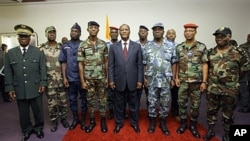United Nations peacekeepers have moved Ivory Coast's former president out of the commercial capital Abidjan where he was captured by forces loyal to the elected president.
President Alassane Ouattara says former president Laurent Gbagbo has been moved out of Abidjan to a villa where "his rights as a former head of state will be respected."
Mr. Gbagbo was captured by Ouattara forces Monday after holding out in an underground bunker at the presidential compound, refusing to recognize that he lost November's vote. Mr. Ouattara says the former president will face charges at both the national and international level for crimes against the Ivorian people.
President Ouattara ordered troops once loyal to Mr. Gbagbo to return to duty after meeting with Mr. Gbagbo's former army chief of staff General Philippe Mangou.
Mangou says there has been an important change in the leadership of the country, so the armed forces must now swear allegiance to their new leader. He says President Ouattara has ordered them to help secure the city of Abidjan and the interior of the country.
Securing Abidjan means rounding up members of Mr. Gbagbo's militant youth wing, who Mangou just weeks ago helped rally to the former president's defense. Mr. Gbagbo says his supporters should stop fighting. But automatic weapons fire continued in parts of Abidjan Wednesday including the downtown Plateau district.
Life in other parts of the city returned to something closer to normal. Supermarkets and pharmacies are open in the 2 Plateau neighborhood. Taxis on Boulevard Francois Mitterand drive down an exit ramp past a bombed-out pick-up truck with a twisted machine gun mounted over its cab.
In the Koumassi neighborhood, motorbikes queue for fuel next to auto supply and radio-repair shops. Women sell fish and onions from plastic tarps on the ground.
At Le Petit Cafe du Grand Nord across the street from Koumassi's main mosque, Laye Konate drinks coffee with his friends.
Konate says people are starting to work again. Shops are open. There is fuel at the station. Life is beginning to return. There is still sporadic shooting at night by Gbagbo supporters, he says, but there are patrols by French troops and U.N. peacekeepers during the night as well.
Two French armored personnel carriers roll past a shop selling bathroom tile, crossing into the other lane to pass men pushing heavy wooden carts of cassava.
Hairdresser Annie Timite says people have really suffered during this crisis.
She says there has been no food and no work for the last two weeks while Ouattara fighters battled for control of Abidjan. Timite says there have been no reprisal attacks against Gbagbo supporters in Koumassi because President Ouattara is asking everyone to stay calm.
Gbagbo supporter Ephraim Aka sits outside his apartment building. He says he has heard that Gbagbo supporters are being harassed, but he has no trouble.
Aka says some people are trying to force an inter-ethnic conflict in Ivory Coast. But since the election he has no problems with Ouattara supporters. My wife is a Ouattara supporter, he says, so there you go.
There are far fewer shops open in pro-Gbagbo areas of the Treichville neighborhood. Tires burn in Boulevard Valery Giscard D'Estaing past the Palais des Sports. Women collect water from a hydrant.
When a young man sitting outside a closed shoe store was asked if he supports the former president, he jumped up and approached reporters, shaking his finger in their faces and telling them they should get back in their car and leave immediately. They did.
UN Moves Gbagbo; Ouattara Orders Army to Secure Abidjan




